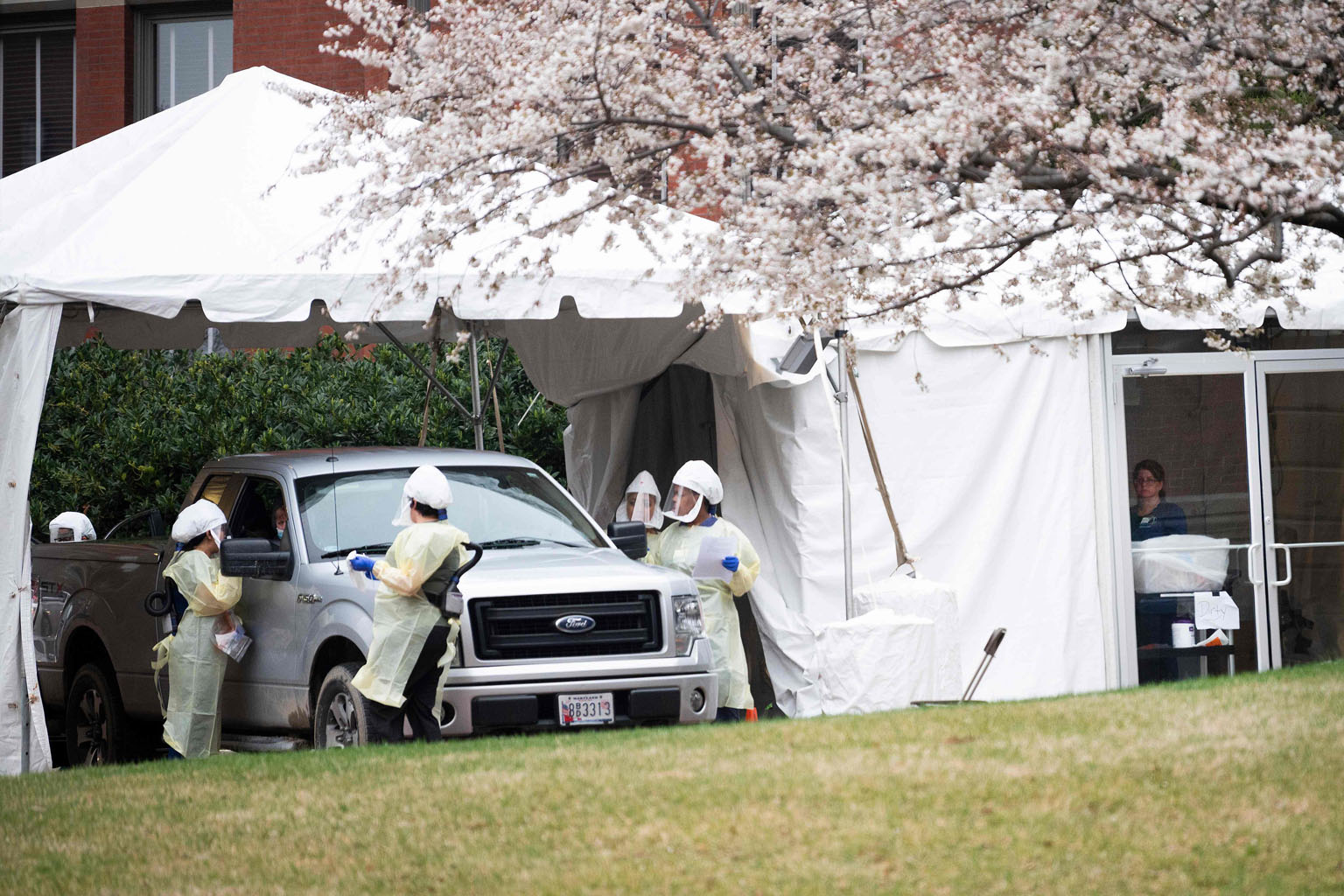Coronavirus: US doctors, nurses appeal for masks amid shortages
Hundreds rally public online to put pressure on elected leaders for personal protective resources
Sign up now: Get ST's newsletters delivered to your inbox

US medical workers conducting doctor prescribed drive-through testing for Covid-19 on Thursday at Johns Hopkins Hospital in Baltimore, Maryland. The mask shortages in US hospitals stem mainly from the prolonged outbreak in China and a widespread buying of masks by anxious citizens in the US and around the world.
PHOTO: AGENCE FRANCE-PRESSE
NEW YORK • An intensive care unit (ICU) nurse in Illinois was told to make a single-use mask last for five days.
An emergency room doctor in California said her colleagues had started storing dirty masks in plastic containers to use again with different patients.
A paediatrician in Washington state, trying to make her small stock last, has been spraying each mask with alcohol after use, until it breaks down.
"The situation is terrible, really terrible," said Dr Niran Al-Agba, 45, the paediatrician. "I don't think we were prepared."
She was one of hundreds of healthcare workers this week who appealed to the public for help in fighting the coronavirus pandemic, which has sickened thousands and killed more than 200 people in the United States.
Doctors, nurses and others are rallying on social media with the hashtag #GetMePPE, referring to personal protective equipment like masks, gowns and face shields, to put pressure on elected leaders.
Medical professionals need a large supply of the masks because they are in direct contact with infected patients and must change their masks repeatedly.
The World Health Organisation's guidelines recommend that health workers use surgical masks but some hospitals require N95 masks, which are thicker, fit more tightly around the mouth and nose, and block out much smaller particles than surgical masks do.
Ms Charnai Prefontaine, an ICU nurse in Illinois, said she is asking the public to implore lawmakers and government officials to speed up the process of bringing resources to hospitals. "I would like to say there is some major happy ending where a cowboy comes in with a ton of masks and we are saved, but I don't see that happening any time soon," said the 30-year-old.
Dr Vidya Ramanathan, 43, a paediatrician in Michigan, said there are not enough sanitiser wipes to clean the workers' face shields, and her hospital is almost out of masks.
The hospital where she works has set up tents outside the building and established a triage system so that those who do not require further care can be sent home for quarantine. "The keys for the public are social distancing and staying at home," Dr Ramanathan said.
The hospital shortages stem mainly from the prolonged outbreak in China and a widespread buying of masks by anxious citizens in the US and around the world.
China produced half of the world's supply even before the coronavirus emerged there.
As the country grappled with its outbreak, it expanded its mask production by nearly twelvefold, but stockpiled what it made.
Last month, US surgeon-general Jerome Adams urged the public to stop buying masks, warning that it would take away important resources from healthcare professionals. This week, Vice-President Mike Pence asked construction companies to donate their N95 masks to local hospitals and to stop making new orders.
A person is more likely to get infected by touching contaminated surfaces than from a droplet travelling through the air, according to infectious disease experts, who also warn of accidental contamination by touching the outside of the mask.
But they also encourage healthcare workers to take serious precautions, given the risk their work exposes them to.
"We don't have immunity... A lot of people are susceptible, and the virus is easily transmittable," said Dr Lucy Wilson, a professor of emergency health services at the University of Maryland, Baltimore County. "I think it is pretty unprecedented in modern times, and we are entering the crisis point."
NYTIMES


